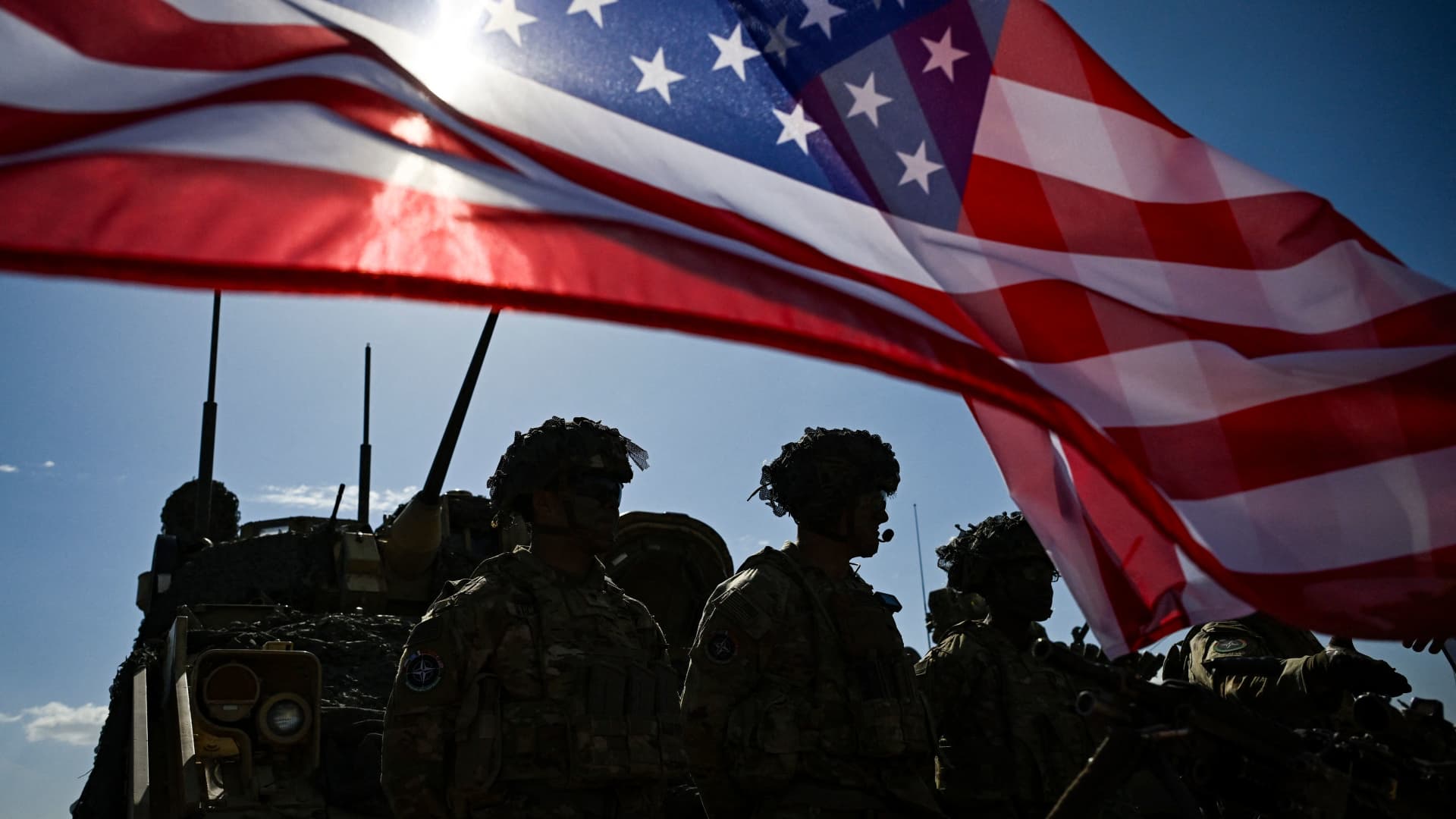This was CNBC’s live blog tracking developments on the war in Ukraine.
The Kremlin doubled down on warning that any deployment of NATO troops in Ukraine would represent a significant and dangerous escalation of tensions between Russia and the military alliance.
When asked to comment on a petition posted on the Ukrainian presidential website Tuesday calling for NATO troops from the U.S., U.K. and EU to be sent to Ukraine, Kremlin spokesperson Dmitry Peskov told reporters that such a move posed a “huge danger.”
Earlier Wednesday, Russian Foreign Ministry spokesperson Maria Zakharova told reporters French troops will be targeted by the Russian army if they are deployed on Ukrainian soil.
In other news, Russia used more than 50 missiles and 20 drones to attack Ukraine’s infrastructure overnight, Ukraine’s President Volodymyr Zelenskyy said Wednesday, with the country’s energy network suffering a “massive attack.”
DTEK, the largest energy company in Ukraine, said on Telegram that Russia had attacked three of its thermal power plants, causing “another extremely difficult night for the Ukrainian energy industry.”
A Russian air strike hit a school sports field in Ukraine’s city of Kharkiv on Wednesday, injuring multiple children and adults, regional governor Oleh Syniehubov said in a Google-translated post on Telegram.
Three male teenagers were injured while playing soccer, Syniehubov said, adding that two of them were in serious condition and had been taken to hospital. A young girl as well as three adults were also injured, some of whom were also hospitalized, according to Syniehubov.
CNBC could not independently verify developments on the ground.
— Sophie Kiderlin
European Union ambassadors have come to an agreement about using the profits from frozen Russian assets for Ukraine, the Belgian Presidency of the Council of the EU said on Wednesday.
“EU ambassadors agreed in principle on measures concerning extraordinary revenues stemming from Russia’s immobilised assets,” it said in a post on social media platform X. “The money will serve to support #Ukraine’s recovery and military defence in the context of the Russian aggression.”
European leaders still have to approve the new law.
As much as 90% of the proceeds will be allocated to a fund for military aid for Ukraine that is run by the EU, Reuters reported, citing multiple EU sources, while 10% would be used for other support of the country.
This comes after the EU earlier this year said it had ringfenced the profits from frozen Russian assets and was discussing if and how they could be used to support Ukraine as legal questions remained unresolved.
— Sophie Kiderlin
Ukraine is on par with Russia when it comes to the production of certain deep strike drones, which are also referred to as kamikaze drones, the head of Ukraine’s state arms manufacturer, Herman Smetanin, told local media.
“In 2024, Ukraine overtook Russia in the production of kamikaze drones similar to the Shahed-131 and Shahed-136, as well as in the production of other attack drones,” Smetanin said, speaking to the Ukrainian defence ministry’s media outlet, Army Inform.
These types of drones carry explosives and detonate on impact. Russia has frequently used them in air strikes throughout the war.
Smetanin did not provide exact figures. CNBC was unable to independently verify his claims.
— Sophie Kiderlin
Timur Bulatov, a Russian activist who has boasted about denouncing LGBT people and Kremlin critics to the authorities, is now in the line of fire himself, charged with discrediting the Russian armed forces.
A notice posted to Moscow’s court website showed Bulatov, an outspoken supporter of Russia’s “special military operation” in Ukraine, was charged under a censorship law that has been used to punish critics of the war.
He told the Ostorozhno Novosti Telegram channel that he did not understand the origin of the charge, which can incur a fine of up to 50,000 roubles ($545) for a first offence. Repeat offenders risk jail terms.
“Where is the discrediting?” he said. “I am a person whose petitions (have led to) the imprisonment of about eight people in St Petersburg, and throughout Russia more than 20.”
The official notice showed Bulatov’s case was registered on Tuesday, but gave no further details. Bulatov has openly discussed his activity as a serial informer whose denunciations have led to a slew of civil and criminal cases being filed against individuals over the years.
— Reuters
Russian forces claimed Wednesday that they’ve seized two more villages in the Donetsk and Kharkiv regions.
Russia’s defense ministry said its central and western grouping of troops had occupied Novokalynove in Donetsk, eastern Ukraine, and Kyslivka, in Kharkiv, northeast Ukraine.
The ministry did not provide evidence for its claims, announced on Telegram, although Russian forces have been making incremental advances in eastern Ukraine in recent weeks. CNBC was unable to verify the latest battlefield claims.
It was widely reported that Russian forces were looking to try to capture the strategically-valuable town of Chasiv Yar in Donetsk before the May 9 “Victory Day” military parade in Moscow.
But (if verified) the latest territorial gains, or “liberations” as Russia calls them, are not located near Chasiv Yar. Analysts at the Institute for the Study of War think tank noted Tuesday that “Russian forces continued assaults near Chasiv Yar on May 7, but there were no confirmed changes to the frontline.”
— Holly Ellyatt
The Kremlin doubled down on warning that any deployment of NATO troops in Ukraine would represent a significant and dangerous escalation of tensions between Russia and the military alliance.
When asked to comment on a petition posted on the Ukrainian presidential website Tuesday calling for NATO troops from the U.S., U.K. and EU to be sent to Ukraine, Kremlin spokesperson Dmitry Peskov told reporters that such a move would be hazardous.
“[The] Kyiv regime is quite unpredictable,” Peskov said Wednesday, in comments translated by NBC News.
“We have repeatedly said that direct intervention in this conflict on the ground by militaries of NATO countries poses a huge danger, a huge danger. Therefore, we consider this an extremely defiant provocation, no less. And of course we are watching this very closely.”
Earlier, Russian Foreign Ministry spokesperson Maria Zakharova told reporters that French troops would be targeted by the Russian army if they were deployed on Ukrainian soil after French President Emmanuel Macron said such a deployment could not be ruled out if Russian troops broke through Ukrainian front lines.
— Holly Ellyatt
French troops will be targeted by the Russian army if they are deployed on Ukrainian soil, Russian Foreign Ministry spokesperson Maria Zakharova told reporters Wednesday.
“It is characteristic that Macron himself explains this rhetoric with a desire to create some kind of ‘strategic uncertainty’ for Russia. We have to disappoint him — for us the situation looks more than certain. We, too, have already decided a long time ago. If the French appear in the conflict zone, they will inevitably become targets for Russian armed forces,” Zakharova said at a briefing, news agency RIA Novosti reported.
French President Emmanuel Macron has signaled several times in recent months that France would not rule out sending ground troops into Ukraine to assist Kyiv’s war effort. The comments have been seized upon by Moscow, which said any troops from a NATO country would lead to a direct conflict between Russia and NATO.
The Western military alliance previously rowed back on Macron’s comments, saying there were no plans to deploy the bloc’s troops in Ukraine.
Macron first made such comments in February but repeated the possibility in an interview with The Economist last week, telling the outlet that if Russian forces broke through Ukraine’s front lines, and if Ukraine asked for assistance, “we would legitimately have to ask ourselves this question” regarding sending troops.
— Holly Ellyatt
Railway infrastructure in the southern city of Kherson came under fire Wednesday, the state-owned rail operator Ukrzaliznytsia said.
“Ukrzaliznytsia is under the enemy’s sights again! On the morning of May 8, a terrorist country attacked the civilian railway infrastructure in Kherson. As a result of enemy strikes, the tracks at the city station were damaged,” the railway network said on Telegram.
Railway officials limited the movement of a train on the Kyiv-Kherson route but said 99 passengers on the affected train were safe. The rest of Ukrzaliznytsia’s trains continue to run according to schedule.
Russian officials say their armed forces do not target civilian infrastructure.
— Holly Ellyatt
Russia used dozens of missiles and drones to attack Ukraine’s infrastructure overnight, Ukraine’s President Volodymyr Zelenskyy said Wednesday morning.
“More than 50 rockets and more than 20 “shaheds” [drones] on infrastructure in the Lviv, Vinnytsia, Kyiv, Poltava, Kirovohrad, Zaporizhzia, and Ivano-Frankivsk regions,” Zelenskyy said on Telegram.
Ukraine’s Air Force Commander Lieutenant General Mykola Oleschuk also posted on the social media platform that, overnight, Russian forces “launched a combined strike with missiles of various types and attack UAVs. In total, the enemy used 76 means of air attack – 55 missiles and 21 attack drones.”
“The whole world should clearly understand who is who,” Zelenskyy said.
“The whole world has no right to give Nazism another chance,” he said, noting that the latest attack took place on the international Day of Remembrance and Reconciliation commemorating those who died in World War II.
Ukraine and Russia routinely characterize each other as “Nazi” or “fascist” regimes, with Moscow using the accusation against Kyiv in large part to justify its unprovoked invasion in February 2022. Ukraine’s president is Jewish.
— Holly Ellyatt
Russian forces launched a “massive attack” on Ukraine’s energy infrastructure overnight, Ukrainian officials said Wednesday.
“The enemy does not abandon plans to deprive Ukrainians of light. Again a massive attack on our energy!” Ukraine’s Energy Minister German Galushchenko said on Facebook Wednesday.
Power plants and transmission facilities were attacked in a number of regions, he said, including the southern Zaporizhzhia region and Vinnytsia and Lviv in central and western Ukraine.
“The enemy wants to deprive us of the opportunity to produce and transmit electricity,” he said, calling on civilians to use power sparingly in order to prevent pressure on the energy system.
DTEK, the largest energy company in Ukraine, said on Telegram that Russia had attacked three DTEK thermal power plants, causing “another extremely difficult night for the Ukrainian energy industry” — a sector that has found itself frequently the target of Russian drone and missile attacks.
“The enemy fired at three of our TPPs. The equipment is seriously damaged,” the company said, noting that the latest attack was the fifth “massive shelling” of the company’s energy facilities in the last one and a half months.
Since the beginning of the full-scale invasion, DTEK thermal power plants have been fired upon about 180 times. During this period, 51 workers were wounded and three power workers were killed in shelling at the stations, DTEK said. CNBC was unable to verify the claims.
— Holly Ellyatt
Ukraine’s military said Wednesday that the capital Kyiv was targeted by Russian missiles overnight.
“The Russians hit Kyiv with Kh-101/Kh-555/Kh-55 cruise missiles, all targets were destroyed by air defense forces, there were no casualties,” the military said on Telegram.
Ruslan Kravchenko, the head of Kyiv regional military administration, said on Telegram that Russian forces attacked the capital with one-way attack drones and cruise missiles. Air raid warnings lasted four hours, he said.
“No hits to residential or critical infrastructure objects were recorded,” he said, although falling debris (as a result of intercepted drones and missiles) injured several people and some residential buildings, he noted.
“Damage to power lines was recorded. One of the villages [in the Kyiv region] is partially without electricity. Energy workers are already working quickly to restore the light,” he said.
— Holly Ellyatt
Belarus is carrying out a “surprise inspection” of its non-strategic nuclear weapons, local state media agency Belta reported on Tuesday.
“The entire range of activities from planning, preparation and use of strikes with tactical nuclear weapons will be checked,” the Belarusian defense minister Viktor Khrenin said, according to a Google translation of Belta’s reporting. Khrenin said the order for the inspection was issued on Tuesday and was a “surprise.”
Last month, Russian news agency Ria Novosti reported that Belarus had taken steps to station “non-strategic nuclear weapons” across the country.
Non-strategic nuclear weapons, also known as tactical nuclear weapons, are designed to be used on battlefields in a military context.
— Sophie Kiderlin
Ukraine’s Security Service, the SBU, said Tuesday that it had exposed a network of Russian security service (FSB) agents who were preparing the assassination of Ukraine’s President Volodymyr Zelenskyy.
“Counterintelligence were detained and SBU investigators foiled the plans of the FSB to eliminate the President of Ukraine and other representatives of the top military and political leadership of the state,” the SBU said on Telegram.
The network included two colonels of Ukraine’s department of state protection, the UDO — which is responsible for Vladimir Zelenskyy’s security — who “leaked” secret information to the Russian Federation, the SBU said.
“One of the tasks of the FSB intelligence network was to search for executors among the military close to the protection of the President, who could take the Head of State hostage and later kill him,” the SBU claimed.
It said the agents also planned to eliminate the Head of the Security Service of Ukraine Vasyl Malyuk, the head of the Ukrainian military intelligence service (GUR) Kirill Budanov and other high-ranking officials.
“The enemy’s plan was as follows: first, the recruited agent had to observe the movement of the person under guard and pass information to the enemy. According to the coordinates of the house where the official was supposed to be, a rocket attack was planned. Then they were going to attack the people who remained at the affected area with a drone. After that, the Russians planned to target with another missile, including to destroy traces of the use of the drone,” the SBU claimed, without presenting evidence.
CNBC was unable to immediately verify the claims made in the SBU’s report and the FSB has not yet commented.
— Holly Ellyatt
Here’s a few pictures from Russian President Vladimir Putin’s inauguration ceremony in the Grand Kremlin Palace on Tuesday.
— Holly Ellyatt
Newly re-inaugurated Russian President Vladimir Putin has told officials that Russia would not shut off dialogue with the West but said Western allies had to “make their choice.”
Speaking in his inaugural address after being sworn in for his fifth term in office, which will keep him in power until 2030, Putin said Russia wants relations with other countries and said talks on “strategic stability” were possible, but on “equal terms,” he said, in comments reported and translated by Reuters.
Putin said Russia’s state system should also be resilient to threats and challenges.
— Holly Ellyatt
Vladimir Putin is about to be inaugurated for a fifth term in office that will run until 2030. The inauguration will be followed by the resignation of Prime Minister Mikhail Mishustin’s government.
The Cabinet’s resignation is not unusual as it’s mandated by the Russian Constitution, but it’ll be interesting to see which officials remain in post, and who’s promoted or demoted.
“This largely formal step will be used to reshuffle the cabinet, with PM Mishustin widely expected to continue in his role,” Andrius Tursa, Central and Eastern Europe advisor at risk consultancy Teneo, said in a note Tuesday.
“The new cabinet is expected to be approved by both chambers of parliament and president within around two weeks,” he said.
“One immediate priority for the Mishustin 2.0 cabinet will likely be tax changes corresponding to Putin’s calls for ‘a more equitable distribution of the tax burden towards those with higher personal and corporate incomes.’ Putin is expected to head to China on his first foreign trip later this month,” Tursa noted.
— Holly Ellyatt
Ukraine says it thwarted Zelenskyy assassination plot; Russia’s Putin sworn in for fifth term






